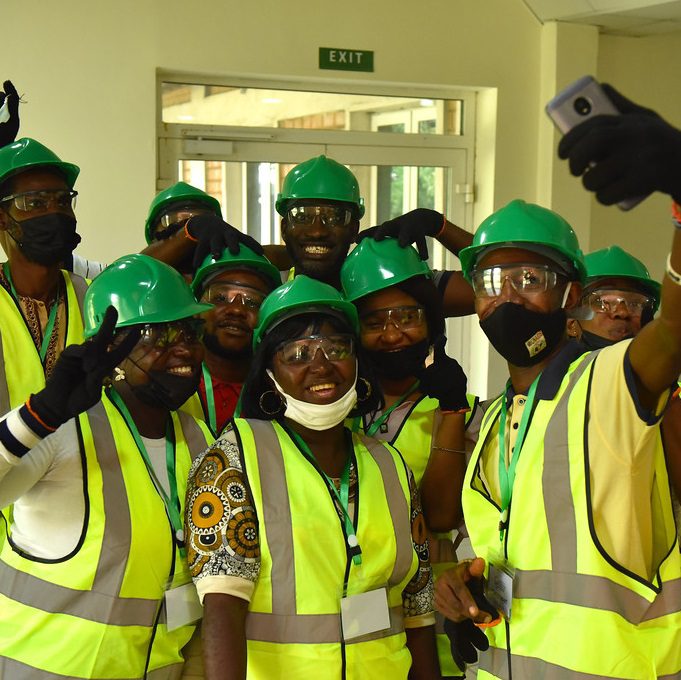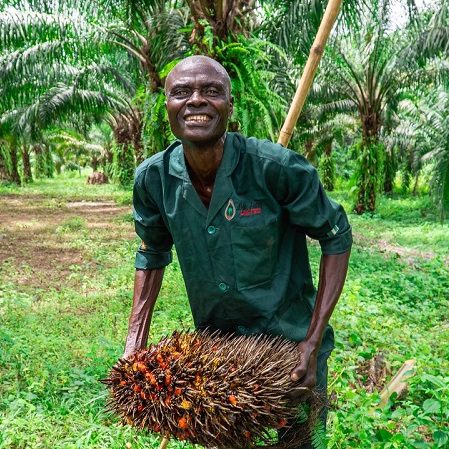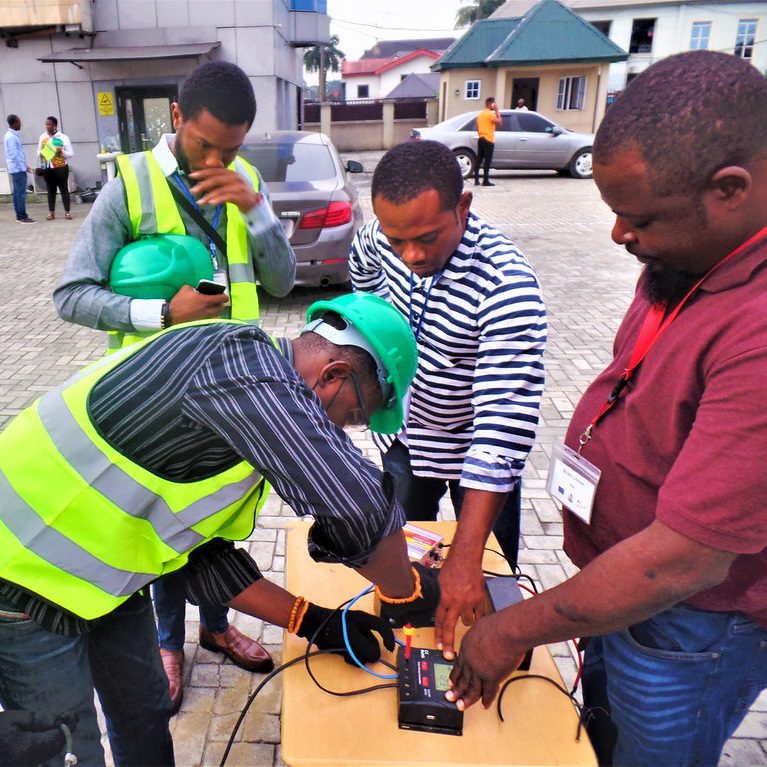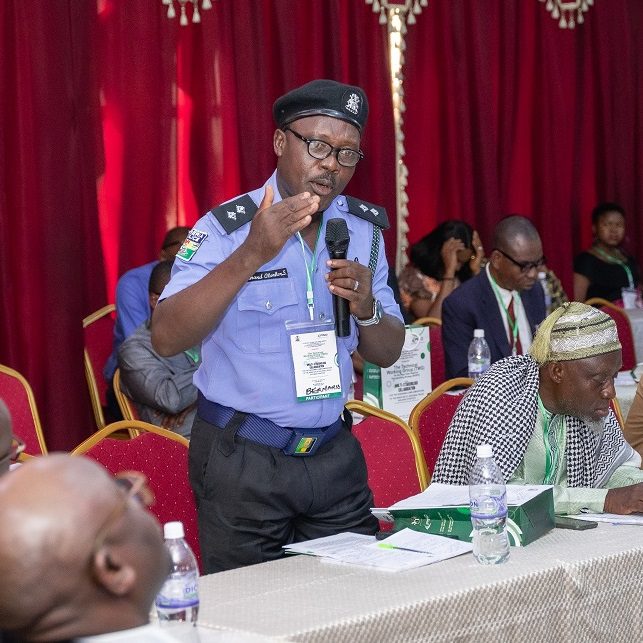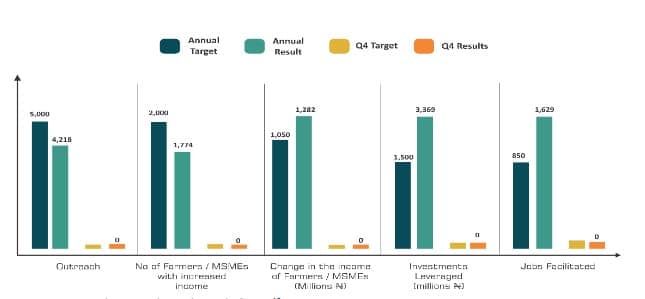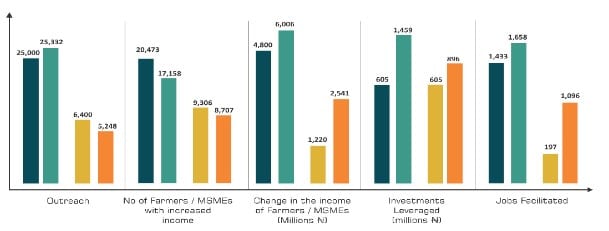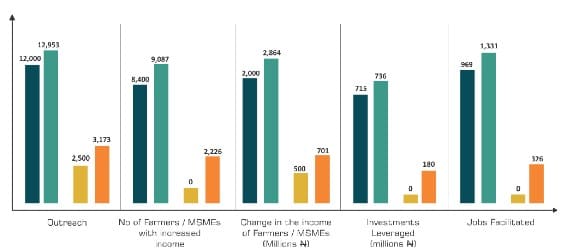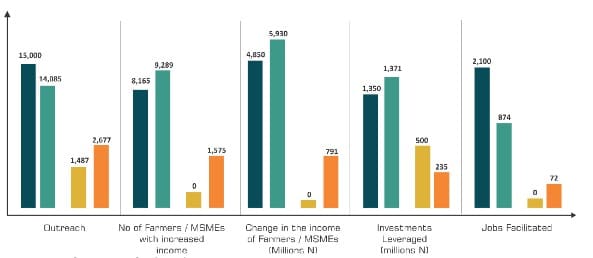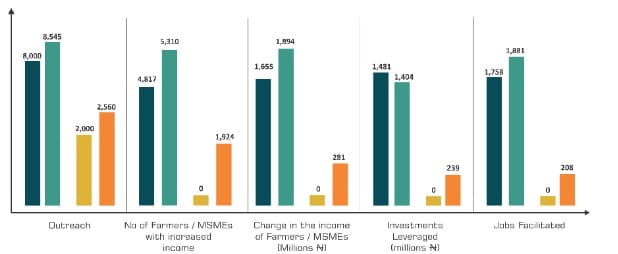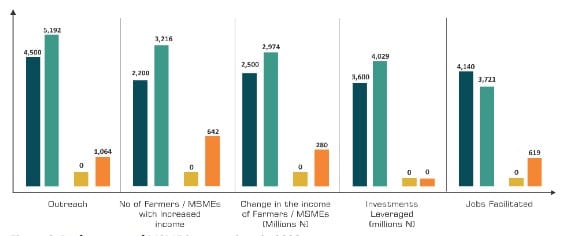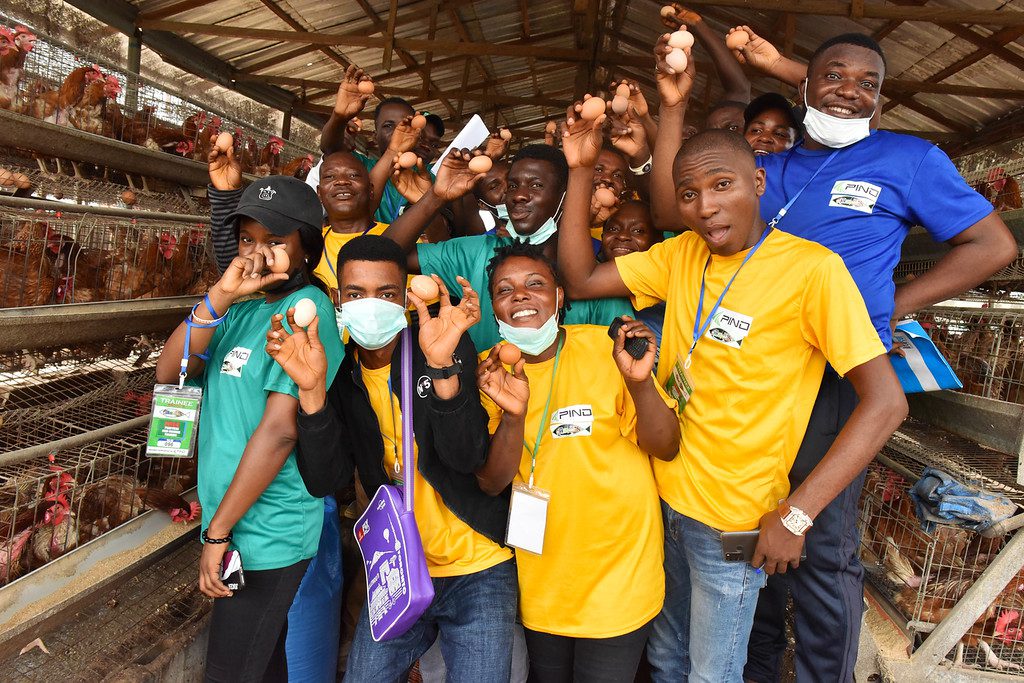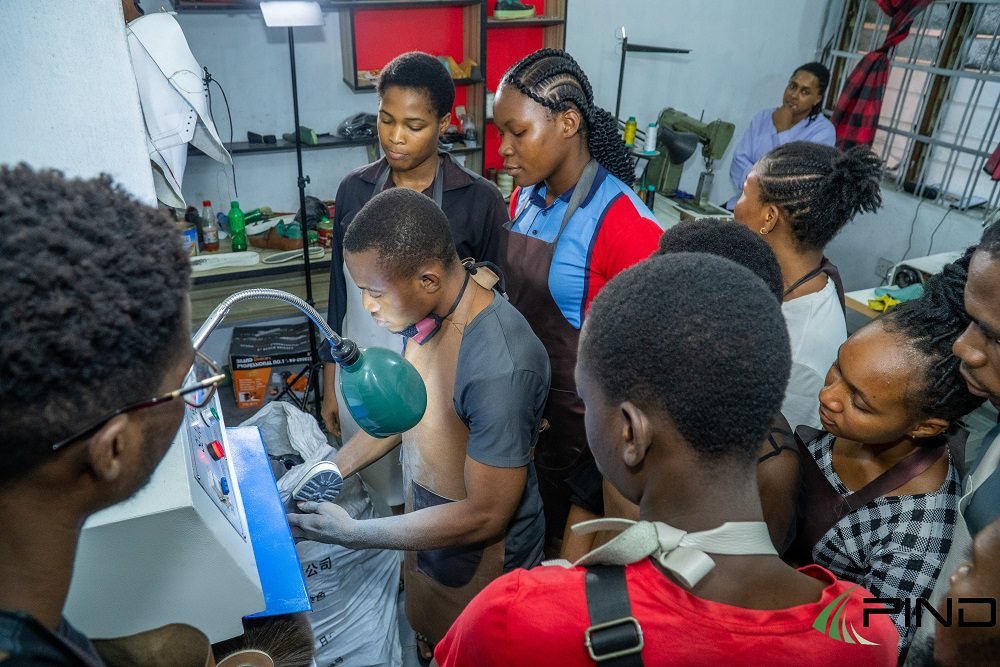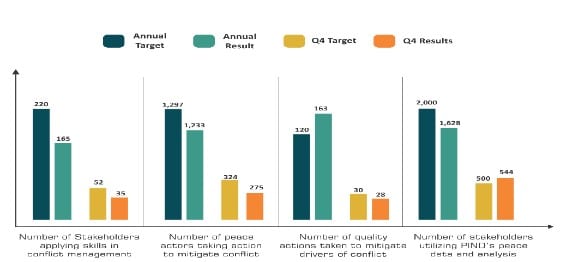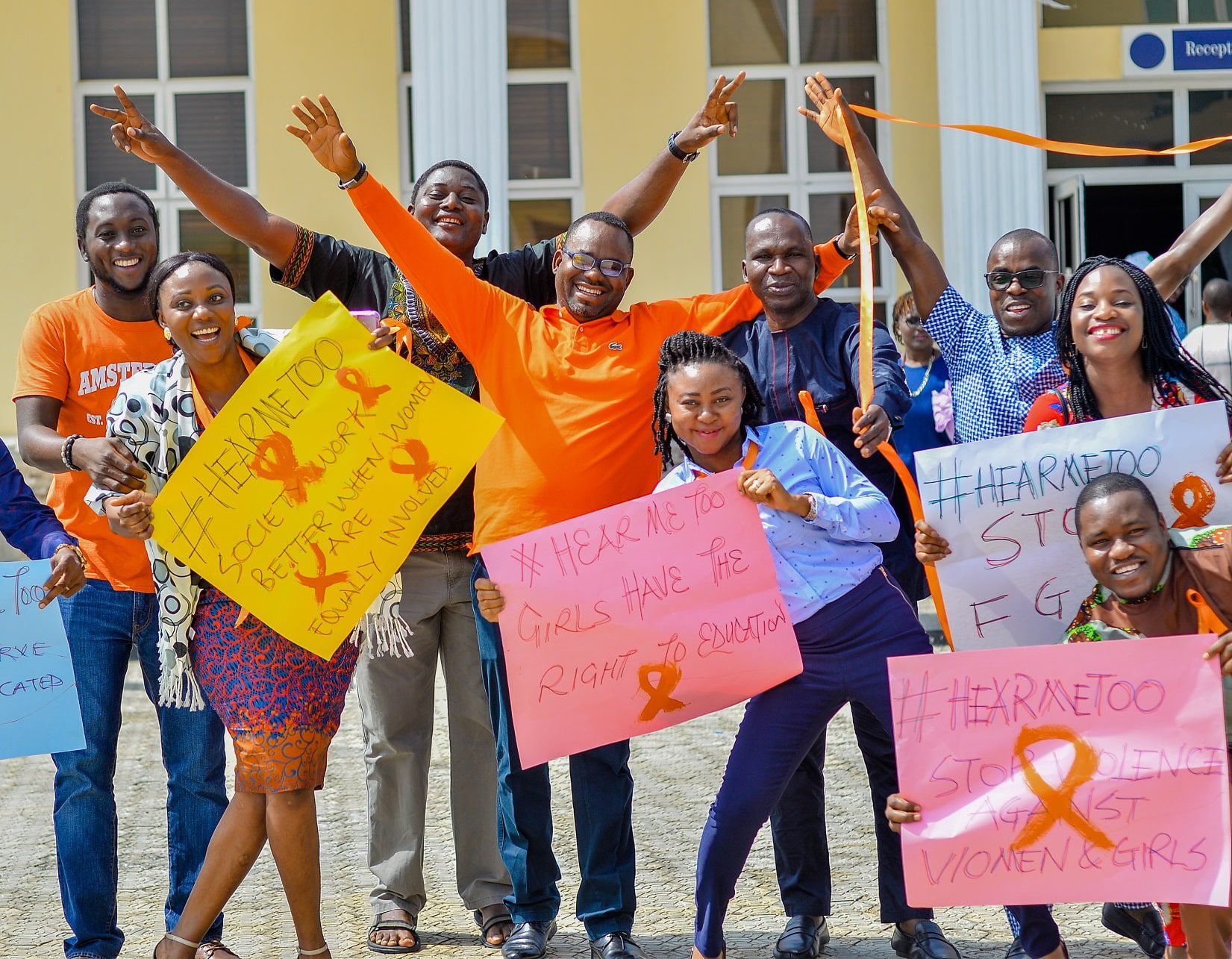PIND 2022 Q4 PROGRESS REPORT
Oct – Dec 2022
PIND’s goal is to identify, catalyze and leverage opportunities, jobs and incomes for our target beneficiaries. In these roles, we robustly engage in identifying multi stakeholder partners, and then act as a catalyst for establishing an enabling environment for socio-economic growth in the Niger Delta region. The goal of these partnerships is to reduce poverty, increase welfare benefits and reduce conflict by implementing interventions that result in stability and equitable increase in employment and incomes of beneficiaries in the nine target States of Abia, Akwa Ibom, Bayelsa, Cross River, Delta, Edo, Imo, Ondo and Rivers. To deliver on this goal, PIND tries to understand the root causes of economic instability, conflict, and fragility concerns to forge community- owned, market-driven, and sustainable results.

Equitable increase in employment and incomes

Reducing Poverty by Overcoming Market Failures

Access to Energy in the Niger Delta

Mitigating Conflicts by Implementing Interventions
SUMMARY OF PROGRESS
Market Systems Development
With PIND’s market development projects continuing to demonstrate progress towards widespread economic growth and poverty reduction in the region, 14,722 farmers and agricultural entrepreneurs were reached with information and services on agriculture and business best practices and efficient technologies in the crop and non- crop sectors. Cumulatively, 70,325 farmers/MSMEs (40% women) were reached in 2022, leading to increased productivity, income and jobs in the Niger Delta PIND incentivized MSMEs and participating farmers to invest ₦1.55 billion to implement good agricultural practices, technological innovations, purchase inputs and undertake other capital expenditures in Q4. A total of ₦12.37 billion has been leveraged in 2022 (₦8.89 billion: equity and ₦4.03 billion: debt). A net income of over ₦20 billion was recorded (28% income change year-on-year (YOY), compared to 2021 season. Also, 11,093 full time equivalent jobs were created by these farmers/MSMEs in 2022.
Access to Energy
PIND continued to play a significant role in driving the market for low–carbon, low–cost solutions that offer high- quality energy access to coastal communities. This has led to more households and businesses accessing electricity. In Q4 2022, PIND partnered with ETIN Power limited and Darway Coast limited, towards the deployment of community energy solutions across three coastal communities in the Niger Delta to leverage a total of N242,403.08 million in investment, towards the engineering, procurement and construction of mini grids across 3 communities. These include a 110kWp solar mini grid at Ajakurama community, Ovia south west LGA, Edo State by ETIN Power limited; a 100kWp solar mini grid at Toru Ebeni community, Sagbama LGA, Bayelsa State by Darway Coast limited; and a 16kWp solar energy cabin powered mini grid at Adagbarassa community, Warri North LGA, Delta State. As a result, 708 households (4,506 persons) and 258 new businesses were connected to electricity in these three coastal communities. Cumulatively, 882 businesses and 1,896 households have been given access to electricity goods and services in 2022. Also, ₦153.094 million was recorded as financial benefits accruing to businesses and households accessing clean energy, facilitated by PIND in Q4, bringing the cumulative for 2022 to ₦595.969 million.
Support to GMoU Communities
In the GMoU communities, PIND continued to build the capacity of fisherfolks and fish processors in the target communities to improve their efficiency and effectiveness. This quarter, PIND facilitated technical training for 118 fisherfolks and processors in Ilaje LGA, Ondo state. Participants were exposed to safety measures in their fishing activities, the appropriate use and maintenance of their fishing gears, and other sustainable fishing practices such as the protection of breeding sites for sustainable fishing activities.
Youth Employment Pathways
PIND continued to scale-up the YEP model into other states. 1,824 youths (45% female, 1% PWD) graduated from the Youth Employment Pathways program in Abia, Akwa Ibom, Delta and Rivers States in 2022, following training to build technical skills (with embedded soft skills training for workplace preparedness) in agriculture, ICT, building construction and services. 590 of them have already accessed employment and income earning opportunities, while 602 of them are currently undergoing internships and apprenticeships.
Peace Building
PIND produced 15 conflict reports (including 14 weekly conflict briefs), a quarterly conflict tracker (Q4 2022), published its perception of safety and security report, and two case studies on data-driven and community-initiated conflict prevention and peacebuilding interventions, in its drive to continually create situational awareness, update stakeholders and catalyze mitigative responses. Also, in Q4 2022, PIND assisted 275 peace actors to constructively resolve emerging conflicts in various communities in the Niger Delta. This led to 28 quality actions1 being taken tomitigate conflict in different locations across the region. Cumulatively, 1,233 peace actors have taken action tomitigate conflict, utilizing 163 quality actions, so far in 2022.
Advocacy
PIND has achieved some progress on its work to ensure access to arable land in the Niger Delta. The Edo State Government Access to Land Committee was presented to stakeholders for validation at the Government House in Benin, and subsequently submitted to the Governor. The draft policy document would be presented for legislative approval in January 2023. Also, an MoU was signed with the Ministry of Niger Delta Affairs to solidify the partnership between PIND and the Ministry towards the development of a harmonized peacebuilding strategy in the region and this led to the formation of the Technical Working Group (TWG) that will help to oversee the crafting of a peace and security framework for the Niger Delta Region. The TWG was formed and inaugurated on the 30th of November 2022, with the first training and stakeholder session taking place on the 1st of December 2022. The outcome of the TWG deliberations would be the development of a harmonized peacebuilding strategy and framework for the region.
Business Development
In line with its effort to diversify and expand its funding base, PIND continued engagements with potential partners to explore new opportunities across its program areas. In Q4, PIND received a grant of $400,000 from the Ford Foundation to implement “The Bridges Project” in five Niger Delta states. PIND commenced preliminary implementation activities targeted at building the capacity of communities and relevant stakeholders for greater efficiency towards the implementation of Petroleum Industry Act (PIA). Also, during the quarter, PIND advanced its collaboration with WorldFish to submit and receive preliminary approval on a Climate-Resilient Aquaculture Systems for Africa (CASA) proposal to the NANMO Partnership, a joint venture between the Bill & Melinda Gates Foundation and the Qatar Fund for Development, which funds projects geared towards climate adaptation, agricultural transformation, and poverty alleviation. In another development, PIND progressed engagements with the United Nations Food and Agriculture Organization (FAO) on the Global Environment Facility (GEF) for the Food Systems, Land Use, and Restoration Impact Programme (FOLUR-IP). This is a project aimed at promoting integrated landscape management and sustainable food systems in Nigeria. PIND aims to implement some components in Ondo and Cross River States.
Communications
By amplifying PIND’s communications this quarter, 11,720,058 people gained new or increased awareness about PIND through its various platforms: newsletters, social media, website, email inquiries, forums and traditional mainstream media. Also, PIND garnered 50 positive media mentions of its work and activities and attracted 72 public endorsements from stakeholders who interacted with its content on the website, newsletters, and social media posts during the review period.
ECONOMIC DEVELOPMENT

As a result, 14,722 (6,021 females) new farmers and enterprises were reached with information and knowledge on best practices and efficient technologies, representing a 104% performance against the quarter’s target of 14,101. Cumulatively, 70,325 (direct:55,883, indirect:14,442) farmers/MSMEs (40% women) have participated in economic activities so far in 2022, achieving 101% of the annual target of 69,500. The results are summarized below.
o Farmers/MSMEs with increased income: The number of adopting farmers/MSMEs who earned increased income on the MSD project in 2022, was estimated to be 45,835, representing 99.5% of the annual target of 46,055 farmers/MSMEs.
o Change in the income of farmers: Consequently, the net attributable income change (NAIC) of these farmers/MSMEs on the project was estimated to be ₦20.95 billion, representing 124% performance of the 2022 target of ₦16.85 billion.
o Value of investment leveraged: PIND leveraged additional investments worth ₦12.6 billion10 (39.98% by women) from participating farmers/MSMEs in the MSD project, for 2022. This performance represents 135% of the 2022 annual target of ₦9.3 billion.
o Number of jobs facilitated: The project facilitated the creation of 11,093 full-time equivalent (FTE) jobs11, by adopting farmers/MSMEs, representing 98% of the 2022 target of 11,330.
AQUACULTURE – CLOSEOUT ACHIEVEMENTS IN Q4 2022
In Q4 2022, there were no new farmers recorded as the sector focused on the outcomes, and impact of the adoption of productivity improvement modules by the farmers reported in the first three quarters before the graduation in Q4. The cumulative outreach of aquaculture as at Q4 remains 4,218 (1771 females)
The sector has the following results, as part of the 2022 aggregated final results:
o Farmers/MSMEs with increased Income: The 2022 overall farmers/MSMEs with increased income was estimated to be 1,774 representing 89% performance of the annual target of 2,000 farmers/MSMEs.
o Change in the income of farmers: Similarly, the 2022 net attributable income change for aquaculture farmers/MSMEs as of Q4 was estimated to be ₦1.28billion, representing 122% performance of the 2022 target of ₦1.05billion.
o Value of investment leveraged: The net estimated investment by the aquaculture farmers/MSMEs in adopting improved fish-pond practices/technologies in their farms was ₦3.37billion (42% were investments by women), representing 225%14 performance of the 2022 target of ₦1.5billion.
o Number of jobs facilitated: This is the combination of additional full-time employment and temporary paid man- hours engaged by aquaculture farmers/MSMEs. The estimated net jobs (full-time equivalent) created in 2022 by the adopting farmers/MSMEs was 1,629, representing 192% of the 2022 target of 850.
KEY ACHIEVEMENTS: CASSAVA
This quarter, PIND continued to expand its activities in productivity improvement, working with new and existing partners across the region, providing support to partners to strengthen relationships and linkages with farmers to ensure access to agricultural information, and quality inputs including stems, fertilizer, and CPPs required for their production. These partners in Q4 conducted training programs and established demonstration plots on good agronomic practices across the region, reaching a total of 5,24816 farmers (2,980 females – 57% females). The cumulative cassava outreach for 2022 was 25,332 representing 101% of the 2022 target of 25,000 and 47% of women participated in the cassava productivity activities.
KEY ACHIEVEMENTS: COCOA
In Q4 2022, the productivity intervention progressed with farmers’ associations engaging farm service providers (FSPs) to work on their farms after receiving training on good agronomic practices (GAP). The FSPs collaborate with input suppliers, equipment dealers, off-takers, and service providers to organize training programs for farmers and set up demonstration farms, showing them how improved practices and technologies work for farmers.
Also, within the reporting period, PIND continued to facilitate access to improved seedling for farmers through primary nursery operators. PIND has an MoU with the Cocoa Research Institute of Nigeria (CRIN) with a vision to strengthen the systems for the production, distribution, and marketing of improved seeds through a network of commercial cocoa seed nursery operators. In the previous quarters, a technical training program on seed handling and management for 31 selected nursery operators was conducted and subsequently supported the trained seed nursery operators to establish seed nurseries in Ondo, Edo, Abia, and Cross River states using the quality, high-yielding cocoa seeds from CRIN.
KEY ACHIEVEMENTS: PALM OIL
In 2022, the focus was on facilitating the business growth of seed actors in the Niger Delta region. PIND facilitated activities such as linking nursery operators and farmers to financial institutions for equipment, technology, and input (seed) financing. Also, engaging seed producers and nursery operators with business models to strengthen their relationships and business growth. It also strengthened the coordination and collaboration among the nursery operators. This led to the purchase of 405,429 seedlings by 818 farmers; surpassing the annual target of 500 farmers purchasing 255, 000 seedlings.
During quarter 4, PIND supported nursery operators to carry out more promotional activities to increase awareness and demand for improved seeds amongst oil palm farmers in the Niger Delta, Also, capacity strengthening of some Palm oil nursery operators (PNOs) on climate-smart nursery management, after-sales services, and nursery record keeping. At least 1,000 farmers were reached directly with this information. It is expected that the farmers will be aware of where and when improved seeds will be available for planting next year.
KEY ACHIEVEMENTS: POULTRY
In this quarter PIND deepened support to farmers through training of new poultry farmers on GAP by its poultry service providers (PSPs), who also promoted improved feeds, quality feeders and drinkers, vaccines etc., to improve productivity of farmers as well as reduce mortality rate of their birds. We also facilitated support to backyard farms through exposures to vaccines and quality information to reduce mortality rate of their birds. PIND’s target for 2022 was to reach an additional 8,000 poultry farmers with information on good poultry practices (GPP) and facilitate access to quality inputs, markets and finance for expansion. In the review period, PIND focused on scaling workshop and training activities for farmers, providing small grants, advisory support, and facilitating linkages to market actors in the sector.
In Q4 2022, a total of 12 training events were carried out by 8 service providers (6 PSPs & 2 VLDs) reaching 2,560 (1129 female) farmers with training in good productivity modules for poultry farmers. These trainings happened in Abia, Akwa Ibom, Bayelsa, Delta, Imo, Ondo, and Rivers States respectively. Some of the farmers were supported with technical and business skills training, linkages to inputs (feed & vaccines), market, and finance. The overall number of farmers reached through training in 2022 was 8,545 across the Niger Delta, representing 106% of the annual target of 8,000 farmers.
KEY ACHIEVEMENTS: MSME DEVELOPMENT & LINKAGES
In Q4, 10 BSPs trained and supported 1,064 MSMEs (512 women-owned) with services including: business management, business plan development, loan application, and linkages to finance through the CBN Agri-Business/Small and Medium Enterprise Investment Scheme (AGSMEIS) and other MSME-friendly loan schemes. Cumulatively, 5,192 MSMEs have been reached so far in 2022, achieving 115% of the target of 4,500 for 2022.
- Aquaculture
-
AQUACULTURE – CLOSEOUT ACHIEVEMENTS IN Q4 2022
In Q4 2022, there were no new farmers recorded as the sector focused on the outcomes, and impact of the adoption of productivity improvement modules by the farmers reported in the first three quarters before the graduation in Q4. The cumulative outreach of aquaculture as at Q4 remains 4,218 (1771 females)
The sector has the following results, as part of the 2022 aggregated final results:
o Farmers/MSMEs with increased Income: The 2022 overall farmers/MSMEs with increased income was estimated to be 1,774 representing 89% performance of the annual target of 2,000 farmers/MSMEs.
o Change in the income of farmers: Similarly, the 2022 net attributable income change for aquaculture farmers/MSMEs as of Q4 was estimated to be ₦1.28billion, representing 122% performance of the 2022 target of ₦1.05billion.
o Value of investment leveraged: The net estimated investment by the aquaculture farmers/MSMEs in adopting improved fish-pond practices/technologies in their farms was ₦3.37billion (42% were investments by women), representing 225%14 performance of the 2022 target of ₦1.5billion.
o Number of jobs facilitated: This is the combination of additional full-time employment and temporary paid man- hours engaged by aquaculture farmers/MSMEs. The estimated net jobs (full-time equivalent) created in 2022 by the adopting farmers/MSMEs was 1,629, representing 192% of the 2022 target of 850.
- Cassava
-
KEY ACHIEVEMENTS: CASSAVA
This quarter, PIND continued to expand its activities in productivity improvement, working with new and existing partners across the region, providing support to partners to strengthen relationships and linkages with farmers to ensure access to agricultural information, and quality inputs including stems, fertilizer, and CPPs required for their production. These partners in Q4 conducted training programs and established demonstration plots on good agronomic practices across the region, reaching a total of 5,24816 farmers (2,980 females – 57% females). The cumulative cassava outreach for 2022 was 25,332 representing 101% of the 2022 target of 25,000 and 47% of women participated in the cassava productivity activities.
- Cocoa
-
KEY ACHIEVEMENTS: COCOA
In Q4 2022, the productivity intervention progressed with farmers’ associations engaging farm service providers (FSPs) to work on their farms after receiving training on good agronomic practices (GAP). The FSPs collaborate with input suppliers, equipment dealers, off-takers, and service providers to organize training programs for farmers and set up demonstration farms, showing them how improved practices and technologies work for farmers.
Also, within the reporting period, PIND continued to facilitate access to improved seedling for farmers through primary nursery operators. PIND has an MoU with the Cocoa Research Institute of Nigeria (CRIN) with a vision to strengthen the systems for the production, distribution, and marketing of improved seeds through a network of commercial cocoa seed nursery operators. In the previous quarters, a technical training program on seed handling and management for 31 selected nursery operators was conducted and subsequently supported the trained seed nursery operators to establish seed nurseries in Ondo, Edo, Abia, and Cross River states using the quality, high-yielding cocoa seeds from CRIN.
- Palm Oil
-
KEY ACHIEVEMENTS: PALM OIL
In 2022, the focus was on facilitating the business growth of seed actors in the Niger Delta region. PIND facilitated activities such as linking nursery operators and farmers to financial institutions for equipment, technology, and input (seed) financing. Also, engaging seed producers and nursery operators with business models to strengthen their relationships and business growth. It also strengthened the coordination and collaboration among the nursery operators. This led to the purchase of 405,429 seedlings by 818 farmers; surpassing the annual target of 500 farmers purchasing 255, 000 seedlings.
During quarter 4, PIND supported nursery operators to carry out more promotional activities to increase awareness and demand for improved seeds amongst oil palm farmers in the Niger Delta, Also, capacity strengthening of some Palm oil nursery operators (PNOs) on climate-smart nursery management, after-sales services, and nursery record keeping. At least 1,000 farmers were reached directly with this information. It is expected that the farmers will be aware of where and when improved seeds will be available for planting next year.
- Poultry
-
KEY ACHIEVEMENTS: POULTRY
In this quarter PIND deepened support to farmers through training of new poultry farmers on GAP by its poultry service providers (PSPs), who also promoted improved feeds, quality feeders and drinkers, vaccines etc., to improve productivity of farmers as well as reduce mortality rate of their birds. We also facilitated support to backyard farms through exposures to vaccines and quality information to reduce mortality rate of their birds. PIND’s target for 2022 was to reach an additional 8,000 poultry farmers with information on good poultry practices (GPP) and facilitate access to quality inputs, markets and finance for expansion. In the review period, PIND focused on scaling workshop and training activities for farmers, providing small grants, advisory support, and facilitating linkages to market actors in the sector.
In Q4 2022, a total of 12 training events were carried out by 8 service providers (6 PSPs & 2 VLDs) reaching 2,560 (1129 female) farmers with training in good productivity modules for poultry farmers. These trainings happened in Abia, Akwa Ibom, Bayelsa, Delta, Imo, Ondo, and Rivers States respectively. Some of the farmers were supported with technical and business skills training, linkages to inputs (feed & vaccines), market, and finance. The overall number of farmers reached through training in 2022 was 8,545 across the Niger Delta, representing 106% of the annual target of 8,000 farmers.
- MSMEs
-
KEY ACHIEVEMENTS: MSME DEVELOPMENT & LINKAGES
In Q4, 10 BSPs trained and supported 1,064 MSMEs (512 women-owned) with services including: business management, business plan development, loan application, and linkages to finance through the CBN Agri-Business/Small and Medium Enterprise Investment Scheme (AGSMEIS) and other MSME-friendly loan schemes. Cumulatively, 5,192 MSMEs have been reached so far in 2022, achieving 115% of the target of 4,500 for 2022.
UPDATE ON NDYEP AND DELTA YEP SCALE-UP
In 2022, 2,183 youths were enrolled in the YEP program across the 4 states with implementation in the same sectors; Agriculture, ICT/Renewable Energy, Building Construction and Services (including finished leather). Nineteen (19) implementing partners manage 25 projects as always with the mainstreaming of soft skills and conflict sensitivity. As at Q4; 13 of 25 projects were completed with 1,824 (Males:1,001; Females: 823 *PWD: 20*) youths graduating. Most of the youths have started making early transitions to Internship/Apprenticeship placements: 602 (Males: 332; Females: 270), and also income-earning opportunities (jobs and self-started enterprises) are 590 (Males: 312; Females: 278).
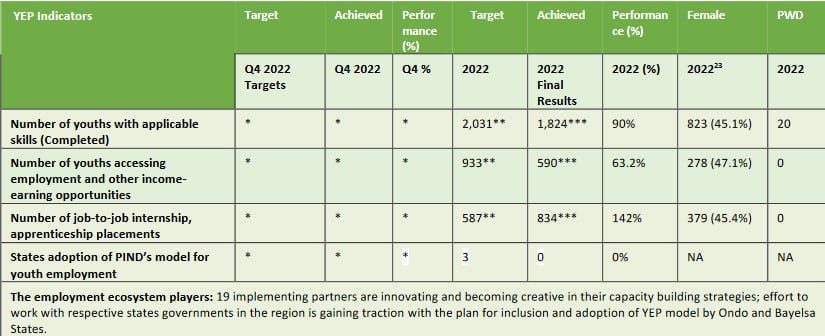

Post-Training Job Linkage
One of the objectives of the YEP was to enable youths to gain access to employment opportunities or be self-employed after the training. As at Q4 2022, out of the 1,824 persons who completed training, 1,193 persons have been engaged under the post training part of the program. Of this number, a cumulative of 590 (Males:312, Females: 287) are already earning income through waged employment or starting their own enterprises, while 603 persons (Males: 332; Females: 270) have been placed on various internship/apprenticeship positions.
More people from the ICT sector (141 persons) recorded a high number of linkages to jobs and business start-ups, followed by the Services sector (86 persons). These categories were more inclined to pursue entrepreneurship start-ups. Majority of internships/apprenticeships placements were in the Aquaculture sector, recording the highest number of persons (430). Only 117 persons were placed under the building construction. Continuous efforts are being made to support the transition of the remaining youths as well as those on internships or apprenticeships to transit into waged employment or entrepreneurships. The table below provides details of their engagements:


The coastline rural communities in the Niger Delta region of Nigeria suffer poor rural electrification, with many of the communities not having access to regular electricity supply to power basic economic assets and household needs, leading to reduced economic activities. Expectations for connection to the National grid anytime soon are unlikely due to high-cost implications and the difficult terrains. Since 2018, PIND has been addressing this gap through alternative and affordable off-grid solutions, capable of targeting not only basic energy needs (i.e lighting and cooking energy), but also productive use of energy at both household and rural enterprise levels (such as used in barber shops and beauty salons).
In Q4 2022, PIND deepened its efforts in providing affordable off-grid solutions by accelerating new partnerships towards commencing 3 PIND supported mini grid installations in 3 riverine communities across Delta, Bayelsa and Edo states. These are a 110kWp solar mini grid at Ajakurama community, Ovia south west LGA, Edo State by ETIN Power limited; the deployment of a 100kWp solar mini grid at Toru Ebeni community, Sagbama LGA, Bayelsa State by Darway Coast Limited and the deployment of a 16kWp solar energy cabin powered mini grid at Adagbarassa community, Warri North LGA, Delta State. These power projects would bring a combined connection of 966 connections comprising 258 businesses and 708 households. Figure 7 provides the summary A2E performance in Q4 and 2022 in general.
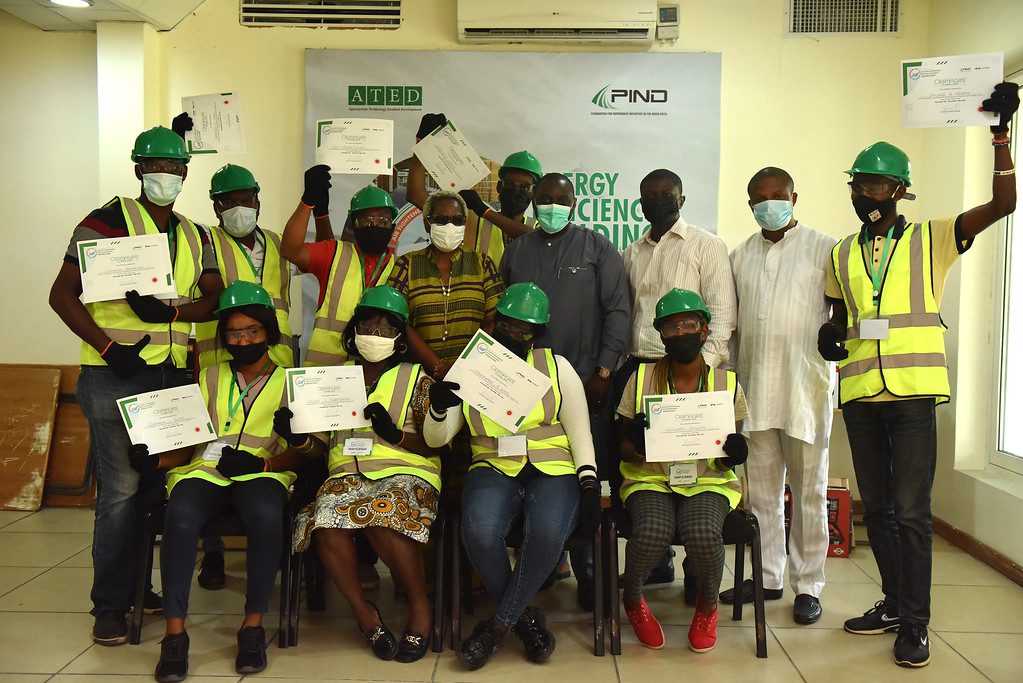

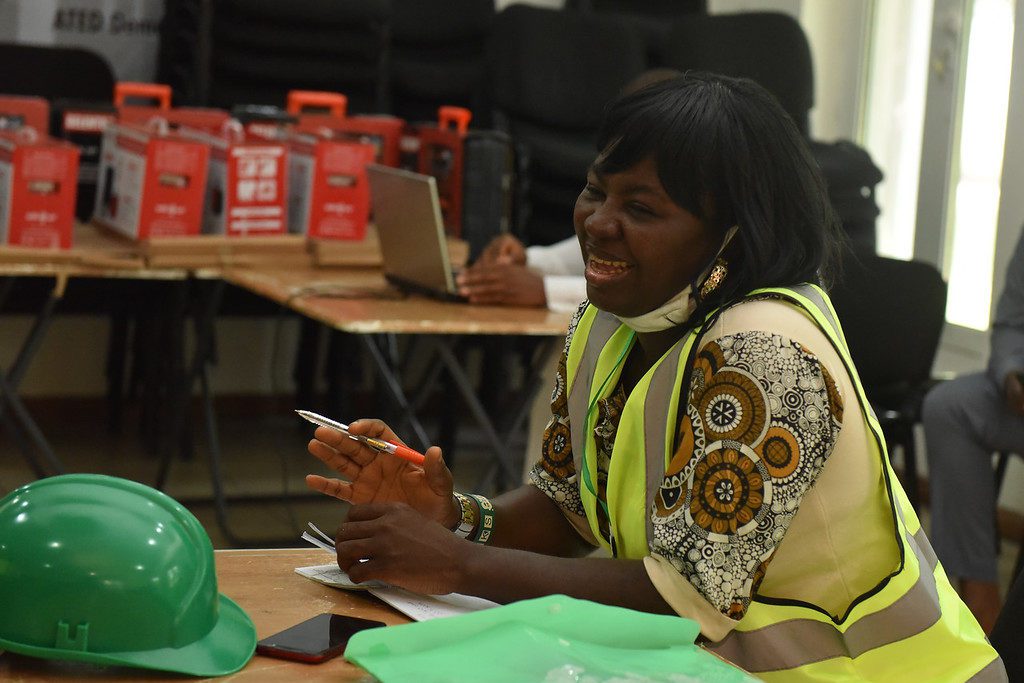

Driving Community energy access through market-based incentives
Many coastal communities are classified as fragmented and early stage markets for renewable energy portfolio investments and are therefore only likely to attract new inexperienced developers. The perceived high risks around demand aggregation, currency and political-economy usually drive up the cost of capital with a knock-on effect on tariffs and subsidies. To attract projects and investors to the region, PIND designed its A2E grant contribution to incentivise new partner power developers looking to make some commercial entry into the coastal community power service markets by de-risking their investments. In Q4 2022 specifically, partnerships with such new operators leveraged a total of ₦242.4million in investment towards the engineering, procurement and construction of mini grids across 3 communities. These collaborations supported ND-focused renewable energy power developers towards the deployment of community energy solutions across 3 coastal communities in the Niger Delta.
Outreach
Within the reporting period, PIND’s Access to energy program had an outreach of 4,506 persons. These outreach groups essentially comprise of business owners and household members connecting to electricity at Adagbarassa, Ajakurama and Toru Ebeni coastal communities within the Niger Delta. The cumulative number of people having access to clean energy in 2022 summed up to 12,258 (123%) as against the target of 10,000.
Also, within the quarter, 966 (258 businesses and 708 households) had access to clean energy from across three communities, mentioned in the previous paragraph. This brings the cumulative for 2022 to 2,778 (882 businesses and 1,896 households accessing clean energy – representing 210% of the 2022 target. In Q4 2022, ₦153,094,375.05 accrued as financial benefits to rural businesses, households and fisherfolks through cost savings and additional income derived through access to mini grids and communal solar refrigeration services. The cumulative financial benefits businesses and households for 2022 summed up to ₦594,696,283.87 (119%) against the 2022 target of ₦500 million. 407.57 tons equivalent of Carbon Dioxide (CO2) emissions avoided through the use of renewable energy technologies across PIND supported community energy projects. Also, in Q4, Access to energy leveraged ₦242.4million through private sector investment into the construction of mini grids across three coastal communities, bringing the cumulative funds leveraged in 2022 to ₦537,132,080.
Assessing the socio-economic benefits of an improved access to electricity
There is continuous recognition of the broader socio-economic development that electricity access brings to coastal communities, particularly through decentralized renewable energy technologies such as solar refrigeration, Solar home system and mini grids that typically focus on relatively low-income customer groups. A desk assessment of all PIND energy access interventions in Q4 2022 suggests that N109,858,950 accrued as financial benefits to rural businesses, households and fisherfolks through cost savings and additional income derived through access to mini grids and communal solar refrigeration services.
Advancing SDG’s goals around Climate action and Gender Equality and Social Inclusion
In 2022, 11 PIND-supported solar energy mini grids and refrigeration hubs with a combined installed capacity of 217kWp generation were estimated to have generated 729,120 kWh of electricity year-round. Solar mini-grids emit approximately 90% less CO2 emissions than grid-connected power and diesel mini-grid alternatives and in combination, these 11 plants delivered emission reductions of 407.57 Tons of CO2 equivalent for the year. This annual saving on emissions helps to advance PIND’s contribution towards SDG 2030 goals. This emissions displacement accounts for the corresponding amount of CO2 that would have been generated from grid electricity or other alternatives in order to achieve the same amount of developmental impact for those communities.On a similar token, female-led businesses are a rarity in Nigeria’s renewable energy space, and PIND is committed to inspiring women to become mini grid owners. In Q4 2022, PIND supported ETIN Power ltd – a female-led power company towards the deployment of a mini grid in a riverine community in Edo state.
PIND and AEAS Interventions in the Niger Delta
The AEAS project focuses on interventions in Aquaculture, Maize and Rice in Delta and Cross River States. Between October and December 2022, (Q1FY23)29 represents the first quarter of the second phase (networking and expansion phase) of the Extension Activity and it captures the performance of the Agricultural Extension and Advisory Services Activity in reference to the networking and expansion stage of its program implementation. In line with the phased implementation approach, emphasis was on consolidation of past achievements, networking of MSMEs, strengthening of partnerships, expansion of buy-in and scaling of adoption in Cross River and Delta States. Accordingly, the capacity of MSMEs was further enhanced through a comprehensive training (eight business skill areas including group dynamics, bio- fertilizer use and complementary fish feeding, marketing & networking skills, seed production and soil testing).
This strategic training was planned to prepare the MSMEs to meet farmers’ demand for the MIPs and extension services especially during the upcoming cropping season. The capacity building has been quite impactful judging from the current solar home system (SHF) success story emerging from Cross River and Delta States. Also 35 MSMEs within the 20 cohorts were commercializing the MIPs (Use of Juveniles, Extension messaging through Demand Stimulation, ICT video extension dissemination) in Q1 of FY23. And across the two states, the 35 MSMEs commercialized the Activity’s MIPs and disseminated extension and advisory services to 1,548 smallholder farmers in this quarter.
To continue the adoption and expansion campaign of MIPs, the Extension Activity identified three additional MIPs including System of Rice Intensification (SRI), Black Soldier Fly (BSF) and Agricultural Insurance. The MIPs were identified on the basis of productivity, return on investment (ROI), accessibility, potential for adoption and scale, environmental impact, climate smart features, and their potential for women/youth inclusiveness.
In the quarter under review, the AEAS continued to champion partnership and collaboration in use of sustainable strategy to drive implementation. In this context, it initiated partnership with CECT-IL to mitigate the menace of Fall ArmyWorm (FAW) that is ravaging maize fields in the region. The partnership which presently comprises Extension Activity, CELT-IL and MSMEs is expected to enable 2,857 farmers to mitigate FAW in their maize fields in FY23 cropping season across Delta and Cross River State. Also, the ongoing collaboration with Honda to drive agricultural solutions and potentially link MSMEs to this business solution and increase the Extension Activity’s numbers received momentum with a demo session held in Nwang and Ukpe communities, Ogoja on the 13th of October 2022 and in Okuku, Yala LGA, on the 14th of October 2022. A total of 122 participants attended the demonstration in 3 locations, which comprised 110 males and 12 females.
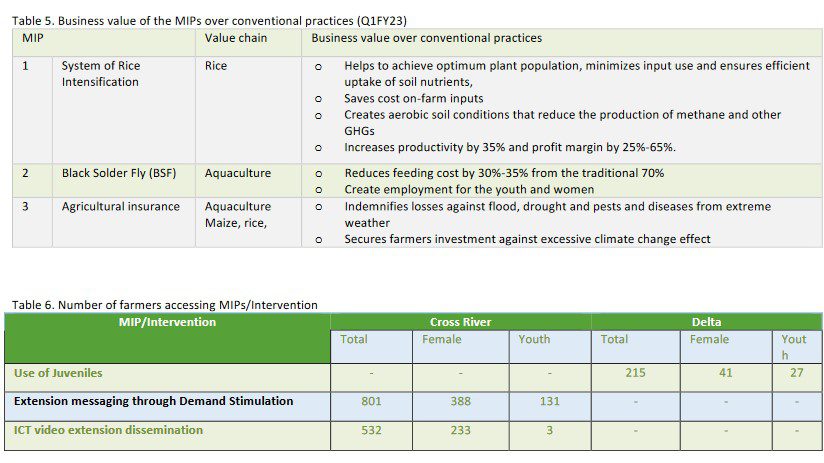

PEACEBUILDING
This section highlights key achievements of the Peace Building program in Q4, 2022
In Q4, PIND continued to undertake interventions in conflict prevention, conflict management and peacebuilding in the Niger Delta region as part of the plan of action aimed at keeping the level of violence as low as possible, particularly in key communities of interest, while also building the social infrastructure and social capital of peace actors across the region for long term sustainable peace. PIND’s peace building strategy recognizes the need for an integrated and comprehensive approach to tackling the complex causes and drivers of conflict; adopting innovative approaches to work on problems of militancy, election violence, gang/cult violence, communal violence, and the cross-cutting issue of Violence Affecting Women and Girls (VAWG). In this strategic phase (2020 – 2024), PIND aims to achieve this objective through the active engagement of 5,000 peace actors in conflict mitigation and reduction.
PIND expanded its strategic response to current conflict trends and patterns which require a more concentrated operational-level support that is sensitive to the rapidly changing dynamics on the ground with 3 key activities: inauguration of the Niger Delta Regional Peacebuilding Strategy (NDRPS) Technical Working Group (TWG); Herders/ Farmers mitigation interventions; and the inauguration of the Prevent Council.
